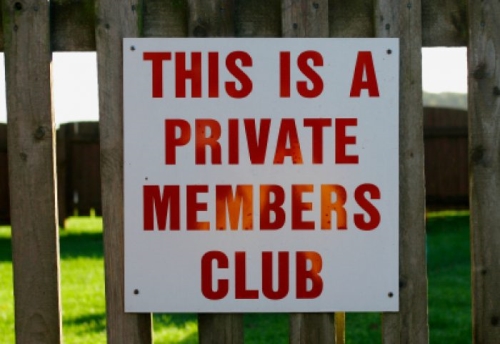Andy Lloyd-Skinner is a member of Golf Business International, a former CEO of the UKGCOA and a director with Melior Golf. Golf Business News sat down with him to discuss his views on the state of the industry.

When we spoke recently, you intrigued me when you spoke of the term ‘private’ being, effectively, a pejorative term in golf, when it came to the future of the sport. Can you elucidate?
Yes, I believe using the word ‘private’ when describing a golf facility is a problem – its synonyms include ‘exclusive’, ‘separate’, ‘not open’, and ‘non-public’. Hardly terms we wish to see associated with golf when we’re looking to increase participation. The antonyms are far more acceptable: ‘known’, ‘public’, ‘open’, ‘sociable’, ‘unconcealed’…
I recently saw a sign in a club car park which read ‘Private Members Golf Club’ – yet it is far from ‘exclusive’ or ‘non-public’; indeed, it is very welcoming to non-members, golf societies, weddings, a daily bridge club … basically anybody who will spend money there. It is no different to around 95 per cent of golf facilities in the UK that describe themselves as ‘private members clubs’.
A ‘private members club’ should be just that: frequented only by members who vote to retain their own rules. To be anything else confuses the golfing customer. Some may argue it is simply a description of the venue’s ownership or constitutional structure, but I believe most people don’t care about ownership or constitution, they simply want to feel welcome and be accepted at the golf venue they choose to frequent as a member or visitor.
So we should refrain from pigeon-holing golf venues by their ownership structure or constitution – private members, proprietary or municipal; by doing so we confuse not only the golf industry but, more importantly, our golfing customers. Instead, we should create categories of golfing facilities that current and potential golfers understand and can relate to.
Do you think there’s an argument for categorising golf venues along similar lines to the way that England Golf has categorised golfers?
 It’s certainly an idea worth considering. By far the largest category of golfer is the ‘latent’ or potential golfer who doesn’t know how to get started – and starter golf facilities in the UK are conspicuous by their absence at the moment. So, fittingly, that would be a good place to begin …
It’s certainly an idea worth considering. By far the largest category of golfer is the ‘latent’ or potential golfer who doesn’t know how to get started – and starter golf facilities in the UK are conspicuous by their absence at the moment. So, fittingly, that would be a good place to begin …
The golf industry could start to categorise venues, in partnership with the venue operator, committee or owner, according to what customers want. The facility operators should then ensure they deliver ‘what’s on the tin’.
You seem quite passionate about ‘starter’ facilities and the like …
A great deal of emphasis is being placed on improving golf’s image by relaxing dress rules, welcoming families, introducing flexible membership structures, encouraging nine-hole play, and so on. These are very worthwhile, but the real driver for growing the game is the golf facility infrastructure: fewer standard 18-hole facilities and many more starter or fun golf-themed facilities.
A small number of well-funded golf venues have already recognised that alterations to their facilities are needed and have converted or introduced starter facilities. This is good news, but their actions have the objective of achieving long-term sustainability for their businesses – who is responsible for the long-term sustainability of golf? I believe this responsibility lies with everyone involved in the industry and who loves golf.
Every golf facility owner or operator – maybe even a members’ club committee – should take a good look at their business operation and assess its sustainability in the long term in its current form. If doubts arise, review the options for changing the facility – and there are ways to achieve this.
How many times have we heard ‘you won’t get better doing the same old thing’? This undoubtedly applies to the golf facility infrastructure in the UK as it currently stands.
Do you believe that different versions of golf, on existing courses, are the way forward?
Absolutely not! We constantly read about nine-hole golf, footgolf, forward tees and even an alternative larger cup on greens, all on the same bit of land, the traditional 18-hole course. Some think this is the way forward and a way of helping struggling golf clubs to become more sustainable.
While England Golf’s attempts at promoting nine-hole golf – with the Golf Express initiative – and speedgolf are to be applauded, these are not the answers to growing golf participation. Different forms of the game to encourage those either not yet capable, or not yet interested, require different types of golf-themed facilities. The traditional 18-hole golf course can only be for the 18-hole golfer – and, again, that can be addressed with the categorisation of the courses.
But we have too many of them, making many unsustainable. Yet the small number of golf-themed, entertainment- type facilities – such as Topgolf centres – are struggling to keep up with demand. At the weekends, customers wait for up to four hours to get a driving range bay at Topgolf – but they still come back for more.
 Conversely, the golf industry seems to concern itself with slow play, believing it to be a contributor to people leaving the game. Meanwhile, Topgolf is in the process of launching TopTracer – an upgraded version of Protracer, as used on TV coverage to track ball flight – because it’s an element which excites.
Conversely, the golf industry seems to concern itself with slow play, believing it to be a contributor to people leaving the game. Meanwhile, Topgolf is in the process of launching TopTracer – an upgraded version of Protracer, as used on TV coverage to track ball flight – because it’s an element which excites.
And Frilford Heath GC, near Abingdon has just opened its new short six-hole course with artificial greens. Two members played the first shots: one was 100 years old, the other only six. The message from Frilford Heath is clear: this facility both retains and creates golfers.
So while initiatives from governing bodies are commendable, what is required to increase participation is actually a change in the golfing infrastructure: golf-themed entertainment centres using digital technology; adventure golf – up-market crazy golf; shorter courses designed for beginners; and ranges incorporating the latest technology and games.
You can’t use an 18-hole golf course for these, but you can replace unsustainable golf courses with these types of facilities and still have plenty of land left – perhaps, to help solve the housebuilding crisis in the UK currently.
So, are you suggesting building houses on golf courses? Surely golf’s governing bodies won’t support such an idea and won’t Sport England refuse to countenance any such planning consultation?
 I read an article last week in which it was claimed that within Woking Borough Council’s borders more land is dedicated to golf courses than houses. Also, currently the Surrey County Golf Union has 116 affiliated golf clubs – and there are around 30 additional golf facilities that aren’t affiliated to Surrey’s golf union. At last year’s Liberal Democrat conference, Sir Vince Cable complained that more land in Surrey was dedicated to golf courses than to housing.
I read an article last week in which it was claimed that within Woking Borough Council’s borders more land is dedicated to golf courses than houses. Also, currently the Surrey County Golf Union has 116 affiliated golf clubs – and there are around 30 additional golf facilities that aren’t affiliated to Surrey’s golf union. At last year’s Liberal Democrat conference, Sir Vince Cable complained that more land in Surrey was dedicated to golf courses than to housing.
These soundbites are often put across in a negative fashion so the golf industry tends to protest and attempt to justify, but the facts are that the UK has an estimated 2,700 full-length golf courses, which is approximately 750 more than 30 years ago. However, demand for the full version of golf has not grown by this 37 per cent increase in supply.
The result is that we have financially unsustainable golf courses, but in some cases they could be better utilised for the benefit of the future of golf by converting to compact, golf-starter facilities, funded by the residual land being considered for housing.
I’m sure golf’s governing bodies and Sport England will listen to, and support, well-justified plans on a case-by-case basis where they occur.
Why did you choose to join Golf Business International?
Before joining my sons in their new venture at Melior Golf, I spent just over three years as CEO of the UK Golf Course Owners Association (UKGCOA). During this time I ‘networked’ with many of the great and good – and some bad – in the golf industry, which helped me to be more effective in my CEO role and also saw first-hand the benefits our association members derived from meeting their golf course owner peers at the events we ran at the UKGCOA.
In short, I am sold on ‘meeting and sharing’ with golf business people. Already, I have started to work with Howard Swan and his son, William, on some golf course reconfiguration opportunities, and have had some excellent planning advice and assistance from Aaron Peate, at Indigo Planning. I hope that both will benefit in the near future from the assistance they have provided to me in working towards creating golf course reconfiguration opportunities.
I also have no doubt that I will want to pick the brains of other Golf Business International members in situations where opportunities will arise for them, as well as Melior Golf.
 What can Golf Business International offer to the industry?
What can Golf Business International offer to the industry?
Golf Business International is not just about networking. Currently, we have 35 golf business consultants as members in a variety of different areas of expertise, all with more than four years’ experience. Where else can this level of expertise and experience relevant to golf business operators be found in one place?
It is essential and only right that every golf business operator becomes aware that Golf Business International is the ‘go-to’ place for the best advice and assistance. Many members have first-hand experience of golf business management in addition to their specific areas of expertise.
And, finally, tell us about your pro-active protest against golf’s dress codes.
(Laughs) I don’t know that I should. It’s something of a guerrilla protest. I regularly secrete the dress rules notice on the bar at my “private” members club – but they keep finding my hiding places. I will have to change them …
The non-profit Golf Business International, formed in 1999 as the Golf Consultants Association, is unique in the UK in its ability to make available a team of highly-respected and experienced golf industry professionals to deal with any aspect of the business of golf through from conception to end.

